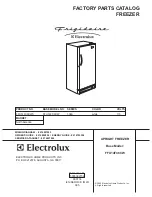
6
This appliance requires a standard 115/120 Volt AC ~60Hz three-prong grounded electrical outlet.
Have the wall outlet and circuit checked by a qualified electrician to make sure the outlet is properly
grounded. When a standard 2-prong wall outlet is encountered, it is your responsibility and obligation
to have it replaced with a properly grounded 3-prong wall outlet.
To prevent accidental injury, the cord should be secured behind the appliance and not left exposed
or dangling.
The appliance should always be plugged into its own individual electrical outlet which has a voltage
rating that matches the rating label on the appliance. This provides the best performance and also
prevents overloading house wiring circuits that could cause a fire hazard from overheating. Never
unplug the appliance by pulling on the power cord. Always grip the plug firmly and pull straight out
from the receptacle. Repair or replace immediately all power cords that have become frayed or
otherwise damaged. Do not use a cord that shows cracks or abrasion damage along its length or at
either end. When moving the appliance, be careful not to damage the power cord.
Extension Cord
Because of potential safety hazards under certain conditions, it is strongly recommended that you do
not use an extension cord with this appliance. However, if you must use an extension cord, it is
absolutely necessary that it be a UL/CUL-Listed, 3-wire grounding type appliance extension cord
having a grounding type plug and outlet and that the electrical rating of the cord be 115 volts and at
least 10 amperes.
Reversing the Door Swing
If you find the direction of opening the door of the appliance inconvenient, you can change it. Holes
on the opposite side have already been prepared at the factory. To reverse your door, follow these
instructions:
1. Take the upper hinge cover from the door and remove the
screws that hold the top hinge
2. Lift the hinge straight up to free the hinge pin from the
socket in the top of the door
3. Lift the door up and away to free its bottom socket from the
hinge pin
4. Remove the screws to the bottom hinge
5. Remove the decorative caps from the opposite side and
plug the holes from the original side with the decorative
caps
6. Move the bottom hinge to the opposite side and tighten the
screws. Use any lock washers or nuts if they were used in
the original installation.
7. Replace door onto the hinge pin on the bottom hinge. Place top hinge pin into door. Insert
screws into the top hinge.
NOTE
:
Some door styles may not be reversible. Consult our website for details






























